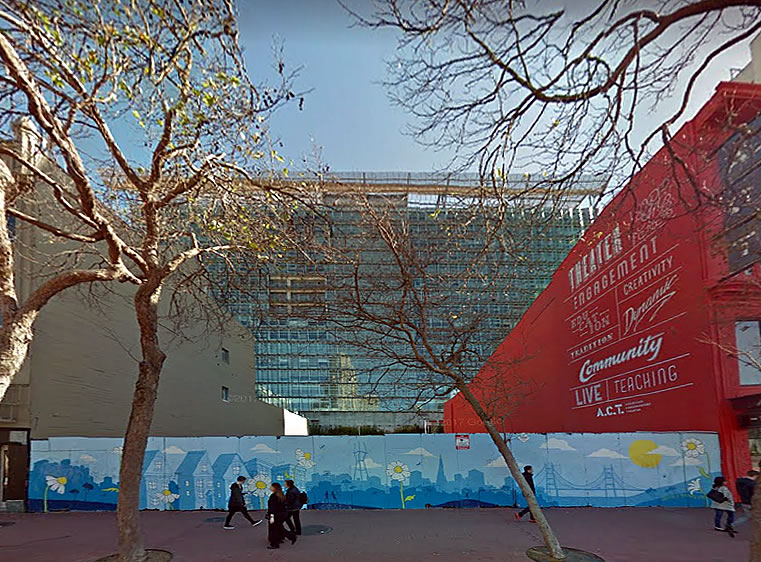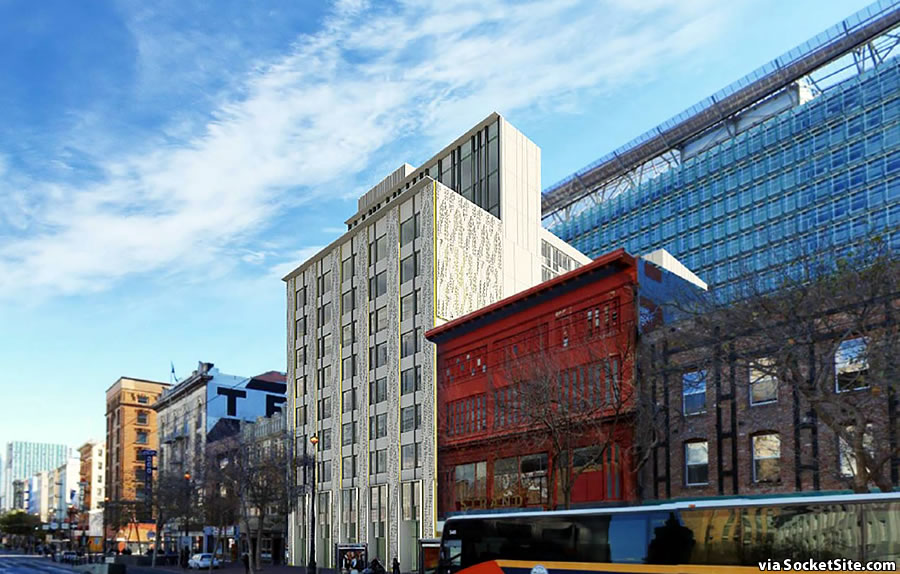Speaking of proposed Mid-Market hotels, plans for a 12-story building to rise upon the long-vacant lot at 1125 Market Street (upon which the former Bell/American/Embassy Theater once stood adjacent to the newly renovated Strand) have been newly drawn and submitted to Planning for approval.
While MacFarlane Partners, which purchased the parcel for $7.8 million in 2012, had proposed to build over 150 apartments, with a ground floor commercial space and underground garage for 47 cars, upon the Market Street site which stretches to Stevenson, at which point San Francisco’s Planning Department had specifically requested “enhanced streetscape improvements” to make Stevenson “a more livable and pedestrian-oriented street,” the parcel was flipped to Pacific Eagle for $19.8 million in 2015 instead.
And as now envisioned by Pacific Eagle, a 160-room hotel could rise up to 12 stories in height upon the 1125 Market Street site with a ground floor restaurant/retail space, a 2,150-square-foot gym, and 19,500 square feet of co-working/office space as well.
As always, we’ll keep you posted and plugged-in.


Anything that will block views of the federal building is a positive step.
yes!
good one, agree
Surprising how many hotels are going into mid-Market, from renovations like the Proper to new construction like this. Is there an underlying trend driving it? Is it being promoted by City Hall? Why here and why now?
I wish more of them were housing. We still need much more, beyond what’s in the pipeline, to satisfy the housing need created by Mid-Market’s tech expansion. I’m afraid recent increases in the inclusionary housing percentage may be making hotel development look more profitable by comparison.
I agree that the percentage increase makes it harder to make residential development profitable. The cost recovery just comes from fewer units. That said, we still need hotels and this is a good place to build them. They generate more foot traffic than residential and this area definitely can use some. It’s still a bloody dump right now.
Yes, I have nothing against hotels. We have a shortage of them too. I just see housing as more important. Families and communities are being torn apart over housing costs, businesses are shutting down since they can’t afford to pay workers enough to afford the Bay Area, etc. Hotel rooms being pricy doesn’t have quite that magnitude of a negative effect.
Is there any precedent for conversion of hotels into apartments (if that’s the way the market turns)? Right now everything seems to be in the opposite direction (Air BnB etc)
@nate – There was a big political ruckus a few years back in SF about some of the higher end hotels trying to convert some of their floors to condos. This was opposed by the unions that represented the hotel workers. Don’t remember how it all shook out in the end. Might have become moot with the housing crash back at the beginning of the decade.
Conversion of hotels/motels into apartments is happening in Reno. Totally different circumstances though as the tourism industry in Reno is on the decline as the city’s economy diversifies. This means there are a lot of old motels downtown from before all the casinos opened in northern California. But if there were a dramatic decrease in demand for hotel rooms in SF, it could be done, assuming the rooms in question were not in hotels that were unionized.
Didn’t the old Fairmont Hotel convert some of its rooms to condos? Or they planned to – not sure if it ever happened.
Reno has a housing crisis because of all the anticipated job growth (non hospitality industry mostly) in the next few years. Motels are being converted to apartments in the Reno area. I’m involved in a project thee and the rumor making the rounds is that one of the twin towers at a casino may be taken over by Amazon for office use. The job base in Reno is becoming more diverse and less service -oriented.
A couple of theories:
– SF continues to be a top worldwide tourist, conference, and visiting employee destination.
– Tax revenue from hotels is great.
– AirBnB is being muzzled a bit by the city, bringing more traffic back to hotels.
– The existing “classic hotel” stock is not modern enough for Millenials tastes (complete speculation)
So you’re arguing that people build hotels b/c they want pay a lot in taxes ?? I would think that point 1 would be such a sufficient – and necessary – explanation that one wouldn’t need others.
The point was that the city is likely to approve / encourage hotels because of the tax revenue
Yes, I realize that; my counterpoint was that w/o point 1, the other 3 are irrelevant. And in anticipation: if you mean that SF is so hot that developers are willing to do commercial (retail and/or office) OR residential (permanent or transient) , and Planning is steering them toward the latter (for the reasons cited), then your point is noted.
Maybe it is the inclusionary housing requirements that make hotels more cost effective.
Airbnb’s popularity in SF is overwhelming evidence that we have a shortage of hotel rooms.
Given the price points for new condo units and their slow upward trajectory (likely in coming years) new housing projects are more and more risky in SF. Hence the raft of entitled projects put up for sale rather than being built – close to 900 units. Hence the hotel projects instead of residential projects. Especially in this area. Mid-Market remains drab, unattractive, sterile and that includes the new projects going up. Hard to see it ever being a grand boulevard again or an upscale residential area..
As to the viability of hotels – tourism is SF’s biggest industry (or is it government employment) and occupancy rates are high. But, but … AirBnB is posing a growing threat to the hotel industry as hotel industry pioneer Schraeger believes. Hence his new NYC hotel ‘Public’. 49% of AirBnB users in 2016 replaced their hotel stay with AirBnB. 23% of business travelers this year are expected to use AirBnB rather than a hotel. Bloomberg recently reported on an alliance between AirBnB and WeWork to capture more of the business travel market – with AirBnB business users being able to use WeWork space. Despite SF’s crackdown on AirBnB, it’s not a given that all these new hotel rooms will not result in an oversupply if these changes in the travel and hotel industries continue.
Whenever I walked by this I imagined it would make a great mid block pedestrian plaza connecting market street to the Federal building. You can see City Hall reflected in the photo. I know, I know, homeless would take it over, underutilization of plot of land, etc., etc., etc.
Isn’t that the problem? It’s funny that Seattle, Portland, LA, Chicago can “green” – park like areas along main boulevards but SF can’t. The photo above is telling – a perfect image of the underwhelming Market Street.
There was a time not that long ago when the Chevron buildings were built with their great street level gardens – Market Street could have taken that direction going forward but no …as you say the homeless, underutilized land and on and on.
I don’t think that’s City Hall, it’s this.
With the price of housing so high in SF because demand is so tremendous, it is ridiculous to suggest that money cannot be made by supplying that need.
I think you’re right.
Mid-block paths would be nice on such a long block. Alas, too late.
Kind of lost is the cool $12 million gain realized by MacFarlane Partners after holding this property 3 years.
The hotel as proposed is the UGLIEST building. No relation to anything besides the unit formula for a hotel….
With the federal building behind the hotel should be a concept and connective design linking the back side alley to the front (maybe a see through hotel with tinted glass panels and floating “rooms” so the activities can be “observed” over at the federal building.
The shown elevations look like any old motel/hotel in any city
Poor concept and follow through on elevations (sim to the “grand” down the street on mission…
UPDATE: Refined Plans for New Mid-Market Hotel Closer to Reality, But…